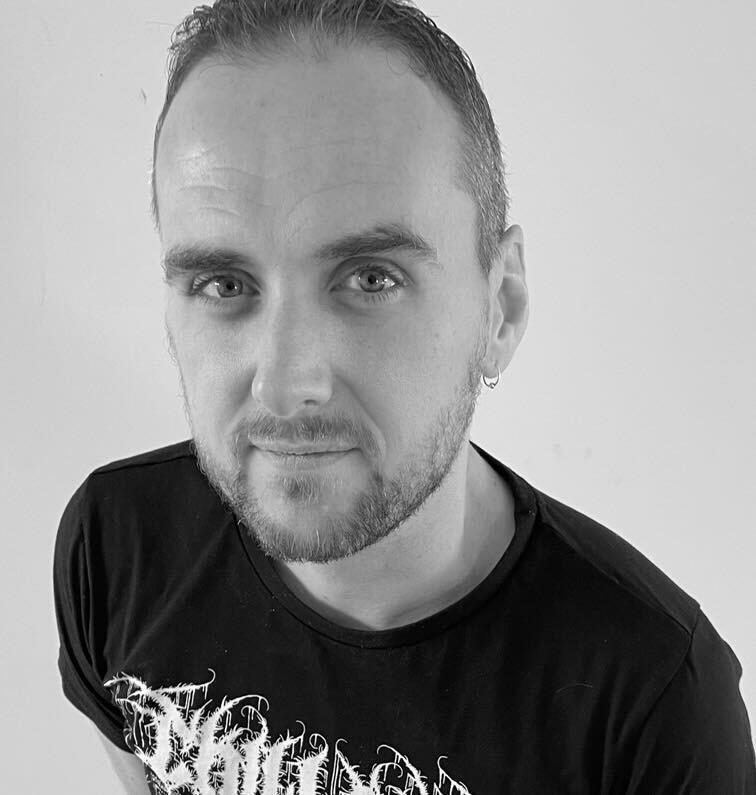John Baizley formed Baroness in 2003, and has been the sole constant member ever since. The band have released five albums to date, all with colour-themed titles. As well as singing and playing guitar, he also creates the band’s sleeves and works as an artist in his own right.

I need to be creative
“The internal combustion engine that gives me the drive to paint is the same thing that gives me the energy and the inspiration to make music. I think, more than choosing one over the other, since I was a very young child, I’ve been creative, in some form or another. That’s something that is a real positive in my life. Acting on my creative impulses is a place where I feel comfortable, and like I feel I have some modicum of control. The big difference is that when I make art, that’s me, that’s 100% me. I’m expressing myself.”
The colour thing became a huge deal for our fans
“After Blue Record came out, our audiences were making these really huge leaps in their understanding of why we had [named albums after] certain colours. And, to be honest, the first couple of albums, we were very specific about which colour it was because they did have a certain feel to us. We didn’t really spend a whole lot of time explaining what those reasons were, because our audience had better and more varied answers, and I didn’t wanna put our audience into a box and say, ‘Oh no, those are the wrong reasons!’ Music is an interpretive thing; it’s not meant for an audience of one, it’s meant for an audience of whomever. So if everybody digests the album and interprets the imagery and the title and the lyrics in a different way, then I’m happy, because that’s been my experience with the music that I like listening to.”
Baroness isn’t just about me
“It may be my vehicle, OK. That may be true. I write the lyrics, that’s a significant portion of the song, and I write the heartbeat of the song. There’s a sound that Baroness has, and I think it’s safe to say that may have a lot to do with me. But I’m not presumptuous enough to think we can get better without the full cooperation and participation of the band. That said, it means I need very competent players – all the players at this point are superior to me on a technical level. Which is great, that makes me better. But they’re also intelligent, they have very valuable opinions. I think any of them will tell ya I’m a bit neurotic and probably obsessive compulsive and a control freak, but there’s nothing I like better than being proven wrong, and I know it.”
- 10 essential alt-metal albums
- The 10 best Mastodon songs
- How Sepultura’s Chaos AD changed the game for 90s metal
- The 10 best songs by the 10 worst nu metal bands
Our music can be dark and uplifting all at once
“I can write an incredibly dark, personal, emotional song, but it doesn’t come across as only those descriptors. It can be incredibly uplifting, or it can be uptempo, or aggressive or fast or mellow or whatever. In a four-piece band with guitars, bass drums, vocals, you’re really fucking limited in the grand scale, so why not do things that shouldn’t work and try to make that work. That’s become another hallmark of our sound – very disparate elements working harmonically.”
We’ve never fit into a ‘scene’
“That’s one of the things I’m most proud of at this point in our career, but it’s one of the things that have been the most difficult for the people we work with. Who do we tour with? What kind of band are we? You know? And the other simple fact is that when we sit down and write a record, I look to the immediate past and say, ‘What were the key elements that worked best with our former record? Let’s not do that, let’s work on something different.’ Our audience never knows exactly what to expect. We wanna be dynamic, we wanna play songs from our back catalogue when we do shows, we don’t wanna make things simple or obvious or ordered correctly. The fun is in the chaos.”
Rock bands need to catch up
“If you look at genres like hip hop or pop, it’s about the single. So when you listen to Spotify or Apple Music or YouTube or the primary sources of listening to music, we’re skipping songs, we’re listening to different styles, different genres, our dynamics are all over the place. So, as a contemporary band, why wouldn’t you adjust to that? I think that we’ve been doing it all along: making sure there’s a lot of territory covered on our albums. I’m not saying I wanna write ‘singles’; what I’m saying is if most people’s listening diet now goes from one type of song to another type of song… to fit the contemporary model, you can write music like that now.”

Sonic Youth changed my life
“The first show I ever saw that was an absolute game-changer was in Richmond, Virginia, in this little island in the middle of the James River in Richmond called Brown’s Island, and it was Sonic Youth, Superchunk and the Boredoms. That’s a diverse and challenging bill to see with 8-10,000 people. There was noise, there were hooks, there was melody, there was dissonance, it was an amazing thing. It appealed to me on a fundamental level that I seem to have maintained, which is that variety is a good thing in music.”
You do you
“The worst kind of advice was any advice I was given when we were a young band. When anybody would tell me, ‘This is how it is, you should do this, you should do that in order to further your career.’ I ignored them, because I didn’t consider it a career at that point. I don’t think that when you’re starting a musical project when you’re young, the endgame is that you become popular or you become successful. I think the most important thing that no one ever tells you is: believe your own bullshit! Do it as hard as you fucking can. Don’t accept criticism like, ‘This is too weird, you’re not gonna make it with this.’ Don’t accept that. Music is meant to be self-expression. If it’s genuine self-expression and everybody in the world hates it, you’ve still done something good, because you’ve been genuine. If you’re making art and somebody tells you what you ‘should’ do, that’s bad advice. If somebody has a genuine conversation with you and if the criticism comes from a place that doesn’t shit on what you’re doing, but helps it grow naturally, then it’s good advice, you know?”
I have to keep changing it up
“I don’t wanna figure out the format to ‘success’. For me, the format to personal success is to have tried everything. If the point of my life is to have as much experience and go on as many adventures as possible, then my art and my music should reflect some element of that.”
Being cynical is OK
“I think a healthy amount of paranoid scepticism is good, as long as it doesn’t rule you. It’s a very valuable skill to learn when somebody is bullshitting you to meet their ends, and when somebody is giving you advice that maybe is not good.”
DIY FTW
“The thing is, in this era of music that we’re in, if you’re a motivated individual who’s in charge of a band or part of a band, you can do a significant amount of what used to need to be done by labels. So if you’ve got the energy and the ambition, I think it’s a worthwhile endeavour to try to do everything yourself. Try to record it, learn about engineering, release your record, just do everything. Trying anything becomes a valuable skill, because you either realise that you don’t have an aptitude for it, or you do, and then you can work with your engineer and with your booking agent and with your manager and with your bus driver and whomever it is. Everybody in music is working really hard because they love doing it. It’s not a particularly lucrative business. So you gotta love doing it, cause you’re gonna be broke!”
…But take help when you need it
“There is a point where you have to be self-aware enough to realise that you have grown to a point or a position where you’re not capable of doing certain things. Or, what’s happened in recent years with our band is we’ve become confident enough in our own capabilities and our own vision that we accept outside advice, primarily from our producer. We feel confident in having a fifth opinion that we can talk about. You don’t take anything at face value, you can talk about it. Before that it was like, ‘Maybe that chorus is too long.’ But learn how to book a show, then you’ll know what your booking agent is doing and you’ll have respect for that. Learn how to drive yourself on tour, use a map, deal with club owners and local crew, learn how to deal with all these people that are working harder than you do. You work for an hour and a half if you’re lucky onstage, at the point where you have a whole team working for you.”
Published in Metal Hammer #327


